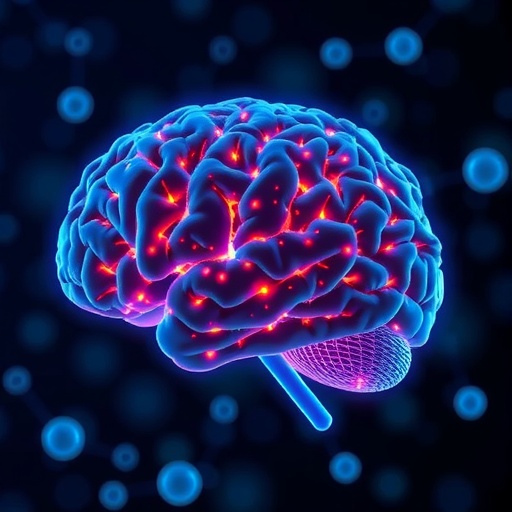In an era marked by ever-increasing demands for cognitive performance and mental resilience, the shadow of sleep deprivation continues to loom large over global health. Chronic paradoxical sleep deprivation (PSD), a condition that profoundly disrupts the natural architecture of sleep, has been conclusively linked to debilitating cognitive deficits, impairing memory, attention, and executive functions. A groundbreaking study recently published in Cell Death Discovery uncovers a promising therapeutic avenue, revealing that nobiletin (NOB) nanoparticles could effectively counteract the detrimental effects of chronic PSD on brain function in experimental rat models.
Nobiletin, a polymethoxylated flavone extracted primarily from citrus peels, has long intrigued neuroscientists due to its potent antioxidant and anti-inflammatory properties. However, its clinical utility has been hampered by poor solubility and bioavailability when administered in traditional forms. The innovative approach of this study lies in encapsulating nobiletin into nanoparticles, thereby enhancing its stability, absorption, and targeted delivery to neural tissues—a crucial factor considering the fragile and complex blood-brain barrier.
The authors undertook a meticulously designed experimental protocol wherein rats subjected to chronic PSD exhibited marked cognitive impairments, closely mirroring human conditions ranging from insomnia-induced memory lapses to neurodegenerative susceptibility triggered by prolonged sleep disruption. Rats treated with nobiletin nanoparticles demonstrated significant improvement across a battery of cognitive assays, including spatial memory navigation and novel object recognition tasks, highlighting the compound’s potential to restore or even enhance cognitive faculties compromised by sleep loss.
At the molecular level, the study elucidates several mechanisms by which nobiletin exerts neuroprotection. Chief among these is the modulation of oxidative stress markers; PSD commonly elevates reactive oxygen species within the hippocampus and prefrontal cortex, regions integral to memory formation and decision-making. Nobiletin’s antioxidant action was quantitatively evidenced by decreases in lipid peroxidation and restoration of endogenous antioxidant enzymes like superoxide dismutase and catalase, thereby mitigating cellular damage.
Beyond antioxidant effects, nobiletin nanoparticles also demonstrated a notable anti-inflammatory impact by downregulating pro-inflammatory cytokines such as IL-1β and TNF-α within the brain. Chronic inflammation is a pernicious consequence of sleep deprivation that exacerbates neuronal apoptosis and synaptic dysfunction. By attenuating this inflammation, nobiletin aids in preserving neuronal integrity and synaptic plasticity, which are essential for effective learning and memory.
Importantly, the study delves into the influence of nobiletin on neurotrophic factors, particularly brain-derived neurotrophic factor (BDNF), whose expression is suppressed under PSD conditions. Elevated levels of BDNF post-treatment suggest a restoration of neurogenesis and synaptic remodeling capabilities, which underpin cognitive resilience and recovery. This finding aligns with burgeoning evidence supporting the critical role of BDNF in the brain’s adaptive responses to environmental stresses such as sleep deprivation.
Pharmacokinetic analyses underscore the superiority of the nanoparticle delivery system. Nobiletin nanoparticles showed enhanced permeability across the blood-brain barrier and sustained release profiles, ensuring prolonged therapeutic concentrations at neural sites. This represents a significant leap forward compared to free nobiletin, whose rapid metabolism and poor brain penetration have limited its clinical translation.
Behavioral data reinforce the neurobiological findings, with treated rats displaying not just recovery but improved performance metrics relative to their PSD-only counterparts. Intriguingly, these benefits were observed without notable adverse reactions or toxicity, underscoring the safety profile and translational potential of the nanoparticulate formulation.
The broader implications of this research extend into numerous realms of neuroscience and clinical therapeutics. Cognitive deficits induced by sleep deprivation are implicated in a host of disorders, including Alzheimer’s disease, Parkinson’s disease, and major depressive disorder. The ability of nobiletin nanoparticles to counteract these deficits suggests potential adjunctive therapies aimed at mitigating cognitive decline across diverse neuropathologies.
Furthermore, this study’s findings resonate with the urgent societal need to address cognitive impairments in shift workers, military personnel, and individuals facing chronic sleep loss due to lifestyle or medical conditions. By offering a pharmacological strategy to restore cognitive function swiftly and effectively, nobiletin nanoparticles could profoundly impact public health.
Scientific enthusiasm for natural compounds as neurotherapeutics is not new; however, this study pioneers a sophisticated nanoformulation technique that enhances the clinical prospects of compounds like nobiletin. The research team advocates for subsequent clinical trials to explore dosage optimization, long-term safety, and efficacy in human subjects, which will be critical for translating these preclinical triumphs into tangible treatments.
Notably, this investigation also paves the way for combinatorial therapies where nanoparticle-delivered flavonoids could synergize with behavioral or psychopharmacological interventions to combat PSD-related cognitive disorders more comprehensively.
The study, while robust, calls attention to the complexity of sleep neurobiology and the multifactorial nature of cognitive deficits. It acknowledges limitations such as the need to evaluate chronic dosing effects and to explore molecular targets beyond the scope of current assays, thereby setting a roadmap for future research.
Emerging from these findings is a compelling narrative: that harnessing the power of nature’s phytochemicals, equipped with cutting-edge nanotechnology, holds unprecedented promise for confronting one of modernity’s most pervasive health challenges—chronic sleep deprivation-induced cognitive decline.
As we stand at the intersection of neuroscience, pharmacology, and nanomedicine, this research underscores the potential of innovative drug delivery systems to revolutionize the treatment landscape for cognitive impairments globally. Nobiletin nanoparticles exemplify this potential, heralding a new frontier in the quest to safeguard brain health against the ravages of sleep loss.
The novel insights reported in this landmark study inspire optimism that future therapies could not only alleviate but actively reverse cognitive deficits, restoring mental agility and quality of life for millions affected by the silent epidemic of sleep deprivation.
Subject of Research: Chronic paradoxical sleep deprivation-induced cognitive deficits and therapeutic intervention using nobiletin nanoparticles.
Article Title: Nobiletin (NOB) nanoparticles ameliorate chronic paradoxical sleep deprivation (PSD)-induced cognitive deficits in rats.
Article References:
Hu, Y., Hou, D., Wang, S. et al. Nobiletin (NOB) nanoparticles ameliorate chronic paradoxical sleep deprivation (PSD)-induced cognitive deficits in rats. Cell Death Discov. 11, 458 (2025). https://doi.org/10.1038/s41420-025-02738-9
Image Credits: AI Generated
DOI: https://doi.org/10.1038/s41420-025-02738-9




